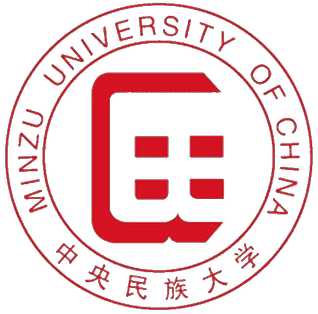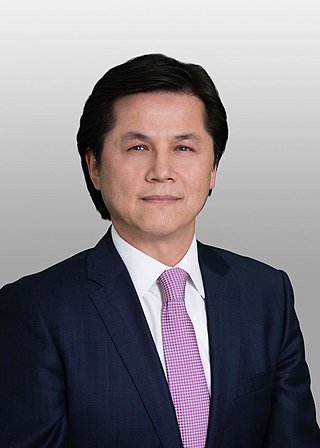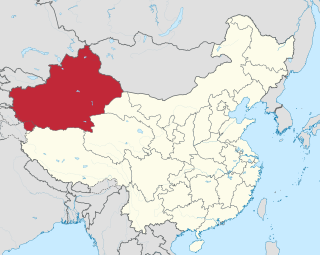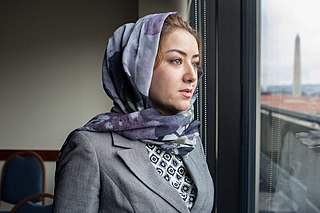
The Uyghurs, alternatively spelled Uighurs, Uygurs or Uigurs, are a Turkic ethnic group originating from and culturally affiliated with the general region of Central and East Asia. The Uyghurs are recognized as the titular nationality of the Xinjiang Uyghur Autonomous Region in Northwest China. They are one of China's 55 officially recognized ethnic minorities.

The Minzu University of China (MUC) is a national public university in Beijing, China. It is affiliated with the National Ethnic Affairs Commission of China. The university is part of Project 211, Project 985, and the Double First-Class Construction.

Rebiya Kadeer is an ethnic Uyghur businesswoman and political activist. Born in Altay City, Xinjiang, Kadeer became a millionaire in the 1980s through her real estate holdings and ownership of a multinational conglomerate. Kadeer held various positions in the National People's Congress in Beijing and other political institutions before being arrested in 1999 for, according to Chinese state media, sending confidential internal reference reports to her husband, who worked in the United States as a pro-East Turkistan independence broadcaster. After she fled to the United States in 2005 on compassionate release, Kadeer assumed leadership positions in overseas Uyghur organizations such as the World Uyghur Congress.

The Uyghur American Association is a prominent Uyghur American non-profit advocacy organization based in Washington, D. C. in the United States. It was established in 1998 by a group of Uyghur overseas activists to raise the public awareness of the Uyghur people, who primarily reside in Xinjiang, China, also known as East Turkestan. The Uyghur American Association is an affiliate organization of the World Uyghur Congress and works to promote the Uyghur culture and improved human rights conditions for Uyghurs.

Nury Ablikim Turkel is an American attorney, public official and human rights advocate based in Washington, D.C. He is a former chair of the Uyghur Human Rights Project, former chair of the United States Commission on International Religious Freedom, and former president of the Uyghur American Association.

Ilham Tohti is a Uyghur economist serving a life sentence in China, on separatism-related charges. He is a vocal advocate for the implementation of regional autonomy laws in China, was the host of Uyghur Online, a website founded in 2006 that discusses Uyghur issues, and is known for his research on Uyghur-Han relations. Ilham was summoned from his Beijing home and detained shortly after the July 2009 Ürümqi riots by the authorities because of his criticism of the Chinese government's policies toward Uyghurs in Xinjiang. Ilham was released on August 23 after international pressure and condemnation. He was arrested again in January 2014 and imprisoned after a two-day trial. For his work in the face of adversity he was awarded the PEN/Barbara Goldsmith Freedom to Write Award (2014), the Martin Ennals Award (2016), the Václav Havel Human Rights Prize (2019), and the Sakharov Prize (2019). Ilham is viewed as a moderate and believes that Xinjiang should be granted autonomy according to democratic principles.

The Xinjiang conflict, also known as the East Turkistan conflict, Uyghur–Chinese conflict or Sino-East Turkistan conflict, is an ongoing ethnic geopolitical conflict in what is now China's far-northwest autonomous region of Xinjiang, also known as East Turkistan. It is centred around the Uyghurs, a Turkic ethnic group who constitute a plurality of the region's population.
The East Turkistan National Movement also known as the East Turkistan National Awakening Movement is a non-profit human rights and political advocacy organization established in June 2017 in Washington D.C. Salih Hudayar, a Uyghur American consultant and graduate student founded the group after pre-existing Uyghur organizations failed to openly call for East Turkestan independence deeming it "controversial".

The Xinjiang internment camps, officially called vocational education and training centers by the government of China, are internment camps operated by the government of Xinjiang and the Chinese Communist Party Provincial Standing Committee. Human Rights Watch says that they have been used to indoctrinate Uyghurs and other Muslims since 2017 as part of a "people's war on terror", a policy announced in 2014. The camps have been criticized by the governments of many countries and human rights organizations for alleged human rights abuses, including mistreatment, rape, and torture, with some of them alleging genocide. Some 40 countries around the world have called on China to respect the human rights of the Uyghur community, including countries such as Canada, Germany, Turkey and Japan. The governments of more than 35 countries have expressed support for China's government. Xinjiang internment camps have been described as "the most extreme example of China's inhumane policies against Uighurs".

Mihrigul Tursun or Mehrigul Tursun, is a reported former Uyghur detainee from Xinjiang, China. After immigrating to the United States in 2018, Tursun claimed that she was taken into the custody of Chinese authorities several times, including being imprisoned at one of a network of political "re-education camps" for Uyghurs, subject to torture, and that one of her sons died while she was in the custody of Chinese authorities in 2015. Her story was widely reported in international media. In 2019 Hua Chunying of the Ministry of Foreign Affairs of the People's Republic of China denied Tursun's allegations and gave the Ministry's own account of events.

Since 2014, the Chinese government has committed a series of ongoing human rights abuses against Uyghurs and other Turkic Muslim minorities in Xinjiang which has often been characterized as persecution or as genocide. There have been reports of mass arbitrary arrests and detention, torture, mass surveillance, cultural and religious persecution, family separation, forced labor, sexual violence, and violations of reproductive rights.

The Uyghur Human Rights Policy Act of 2020 is a United States federal law that requires various United States government bodies to report on human rights abuses by the Chinese Communist Party (CCP) and the Chinese government against Uyghurs in Xinjiang, China, including internment in the Xinjiang re-education camps.

Rushan Abbas is a Uyghur American activist and advocate from the Xinjiang Uyghur Autonomous Region in China. She is the founder and executive director of the nonprofit Campaign for Uyghurs. Abbas became one of the most prominent Uyghur voices in international activism following her sister's detainment by the Chinese government in 2018.

Salih Hudayar is a Uyghur-American politician known for advocating for East Turkistan independence. He founded the East Turkistan National Awakening Movement and has since been leading the movement calling for the "restoration of East Turkistan's independence."

Rahile Dawut is a Uyghur ethnographer known for her expertise in Uyghur folklore and traditions. Formerly a professor at Xinjiang University, where she founded the Minorities Folklore Research Centre, she was disappeared by the Chinese government in 2017 and has not been seen since. In 2023, Rahile received a life sentence for "endangering state security".

Xinjiang is the leading producer of cotton in China, accounting for about 20% of the world's cotton production and 80% of China's domestic cotton production. Critics of the industry's practices have alleged widespread human rights abuses, prompting global boycotts. China rejects accusations that any human rights abuses occur either within the Xinjiang cotton industry or within China overall.

The Uyghur Tribunal was an independent "people's tribunal" based in the United Kingdom aiming to examine evidence regarding the ongoing human rights abuses against the Uyghur people by the Government of China and to evaluate whether the abuses constitute genocide under the Genocide Convention. The tribunal was chaired by Geoffrey Nice, the lead prosecutor in the trial of Slobodan Milošević, who announced the creation of the tribunal in September 2020.

Rayhan Asat is a Uyghur lawyer and human rights advocate. Since 2020, she has led a public campaign for the release of her brother, Ekpar Asat, who has been held in the Xinjiang internment camp system since 2016, and on behalf of the Uyghurs and other ethnic minorities in China. In 2021, she joined the Strategic Litigation Project at the Atlantic Council as a Nonresident Senior Fellow and became a Yale World Fellow. Asat is also a Senior Fellow at the Raoul Wallenberg Centre for Human Rights and President of the American Turkic International Lawyers Association.
Internet Protocol Video Market (IPVM) is a security and surveillance industry research group and trade publication based in Bethlehem, Pennsylvania that focuses on reviewing and reporting on video surveillance technology.
The OHCHR Assessment of human rights concerns in the Xinjiang Uyghur Autonomous Region, People's Republic of China is a report published on 31 August 2022 by the Office of the United Nations High Commissioner for Human Rights (OHCHR) concerning the treatment of Uyghurs and other largely Muslim groups in China. The report concluded that "[t]he extent of arbitrary and discriminatory detention of members of Uyghur and other predominantly Muslim groups, pursuant to law and policy, in context of restrictions and deprivation more generally of fundamental rights enjoyed individually and collectively, may constitute international crimes, in particular crimes against humanity." Human rights commissioner Michelle Bachelet released the report shortly before leaving the office.
















